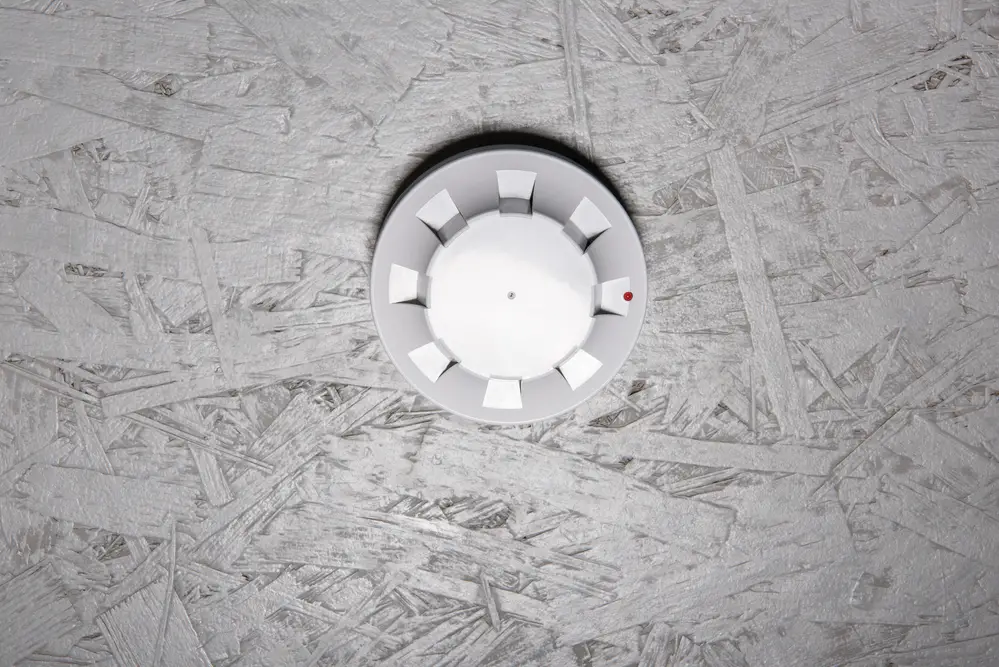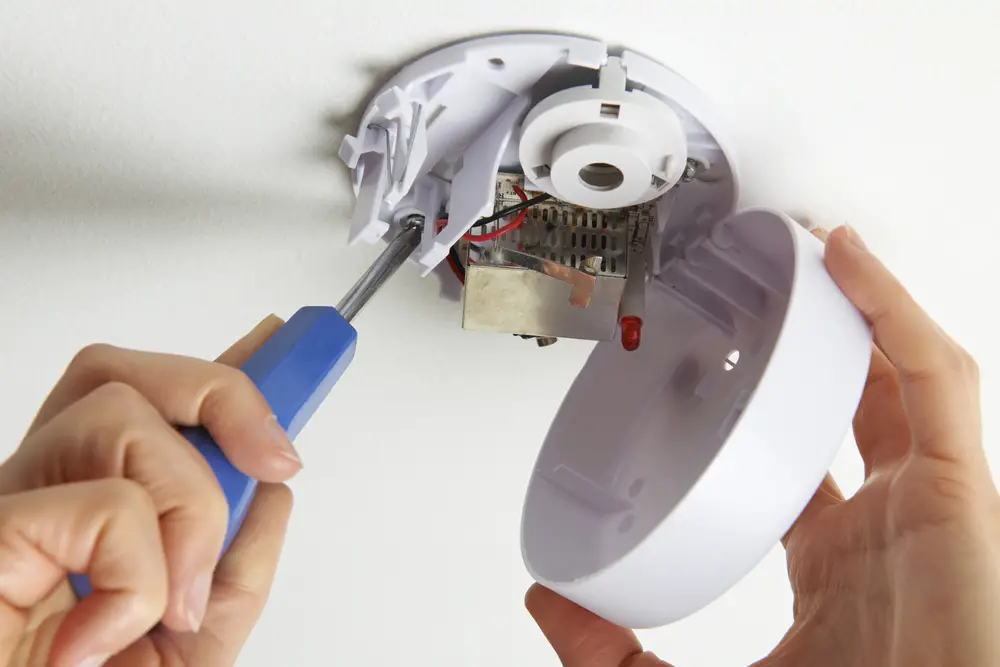Smoke alarms are an essential part of every home’s safety system, but have you ever experienced all of them going off at once?
It can be a startling experience, but there are reasons why this might happen.
In this article, we will explore the question, “Why would all smoke alarms in your home suddenly go off together?”
Key Takeaways
- False alarms can be caused by low batteries, power issues, and malfunctions.
- Smoke alarms can also be triggered by dust, humidity, or other environmental factors.
- Understanding the causes of false alarms is key to preventing unnecessary disruptions and ensuring your home is safe.
Reasons for False Alarms

Smoke alarms are designed to keep you safe by alerting you to the presence of smoke or fire in your home.
See Also: Can Paint Fumes Set Off a Smoke Detector?
However, sometimes they can go off when there’s no danger present. Here are some common reasons why smoke alarms may trigger a false alarm:
| Entity | Explanation |
|---|---|
| False alarm | Smoke alarms can trigger a false alarm if there is no smoke or fire present. This can be caused by a number of factors, such as a malfunctioning sensor or external factors that can disrupt the performance of the device. |
| Sensor | Smoke alarms use sensors to detect smoke or fire. If the sensor is dirty or malfunctioning, it can trigger a false alarm. |
| Steam | Steam from a hot shower or bath can trigger a false alarm if the smoke alarm is located too close to the bathroom. |
| Dust | Dust can accumulate on the sensor of a smoke alarm, causing it to malfunction and trigger a false alarm. |
| Cooking | Smoke from cooking can trigger a false alarm if the smoke alarm is located too close to the kitchen. |
| Humidity | High humidity can cause the sensor of a smoke alarm to malfunction and trigger a false alarm. |
| Burnt food | Smoke from burnt food can trigger a false alarm if the smoke alarm is located too close to the kitchen. |
| Volatile organic compounds | Certain chemicals found in cleaning products and other household items can trigger a false alarm. |
| Spiders | Spiders can crawl into the sensor of a smoke alarm and cause it to malfunction, triggering a false alarm. |
It’s important to note that while false alarms can be frustrating, it’s better to be safe than sorry. If your smoke alarm goes off, always treat it as a real emergency until you can confirm that there is no danger present.
Battery and Power Issues

If all the smoke alarms in your home are going off at the same time, it could be due to battery or power issues.
Smoke alarms typically use replaceable batteries or have backup batteries that need to be replaced periodically. If the battery is low or dead, the smoke alarm will beep intermittently to alert you to the issue.
To fix this issue, you should replace the battery in the affected smoke alarm as soon as possible.
It’s also a good idea to replace the batteries in all your smoke alarms at the same time, even if they’re not beeping, to ensure they’re all functioning correctly. Most smoke alarm batteries have a lifespan of about 6-12 months, depending on the manufacturer and model.
Another possible cause of all your smoke alarms going off at the same time is a power surge or electrical current issue.
If your smoke alarms are hard-wired into your home’s electrical system, a power surge can cause them to malfunction and go off unexpectedly.
To fix this issue, you should check your home’s electrical system for any issues and consider installing surge protectors to prevent future power surges. If you’re not sure how to check your home’s electrical system, it’s best to hire a licensed electrician to do it for you.
Alarm Malfunctions and Troubleshooting
If all smoke alarms in your home go off at the same time, it may be due to an alarm malfunction. Smoke alarms can malfunction for various reasons, including electrical issues, low battery, or end of life. Troubleshooting the issue can help you determine the cause and resolve the problem.
Troubleshooting
To troubleshoot the issue, start by checking the batteries in your smoke alarms. If the batteries are low, replace them with new ones. If the batteries are not the issue, check the reset button on each alarm. Pressing the reset button can help reset the alarm and stop it from going off.
If the reset button does not work, check the instructions that came with your smoke alarms for troubleshooting tips. The instructions may provide additional information on how to reset the alarms or troubleshoot the issue.
End of Life
Smoke alarms have a limited lifespan and need to be replaced every 10 years. If your smoke alarms are over 10 years old, it may be time to replace them. Check the manufacture date on each alarm to determine if it is time for a replacement.
Malfunction
If the smoke alarms continue to go off after troubleshooting, it may be due to a malfunction. Malfunctions can be caused by various issues, including electrical problems or faulty sensors. It is recommended to contact a professional to inspect and repair the smoke alarms if you suspect a malfunction.
| Issue | Troubleshooting Tips |
|---|---|
| Low Battery | Replace batteries with new ones |
| Reset Button | Press the reset button on each alarm |
| End of Life | Replace smoke alarms every 10 years |
| Malfunction | Contact a professional to inspect and repair the smoke alarms if you suspect a malfunction due to electrical or sensor issues |
Remember, smoke alarms are essential for your safety and should be properly maintained to ensure they are working correctly. By troubleshooting and addressing any issues promptly, you can help ensure your smoke alarms are functioning correctly and providing the protection you need.
Fire and Emergency Situations
When all smoke alarms in your home go off at the same time, it could be a sign of a fire or emergency situation. In such cases, it is important to act quickly and follow the necessary steps to ensure your safety and that of your loved ones.
If you suspect a fire or emergency situation, the first thing you should do is call 911. This will alert the local fire department and other emergency services to your situation. Be sure to provide them with your address, the type of emergency, and any other relevant information they may need.
While waiting for emergency services to arrive, you should evacuate your home immediately. Follow your home fire escape plan and make sure that everyone in the house is aware of the emergency and knows how to exit the building safely.
It is important to note that you should never ignore a smoke alarm, even if you suspect it may be a false alarm. According to the National Fire Protection Association, smoke alarms are a critical component of home fire safety and can save lives by alerting you to a fire in its early stages.
In addition to having working smoke alarms in your home, it is also important to have an emergency plan in place. This should include identifying escape routes, designating a meeting place outside the home, and practicing your emergency plan with your family.
By taking these steps and being prepared for emergencies, you can help ensure your safety and that of your loved ones in the event of a fire or other emergency situation.
Conclusion
In summary, there are several reasons why all smoke alarms in your home may go off at the same time. It could be due to a malfunction or breakage in the smoke alarm, oversensitivity, power surges, humidity, or dust in the air.
If your smoke alarms are hard-wired, it is important to ensure that the backup batteries are replaced regularly to prevent false alarms. You can also try cleaning the smoke detectors to remove any accumulated dust or debris.
In addition, it is important to have a home fire escape plan in place and to practice it regularly with your family. This will ensure that everyone knows what to do in case of a fire emergency, and can help prevent injuries and fatalities.
Remember, smoke alarms save lives by alerting you to a fire in your home. It is important to ensure that your smoke alarms are functioning properly and to take immediate action if they go off. If you are unsure about the cause of the alarm, it is always better to err on the side of caution and evacuate your home.
For more information on smoke alarm troubleshooting and maintenance, refer to the resources provided by the National Fire Protection Association (NFPA) and Consumer Reports.

